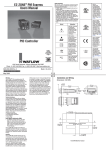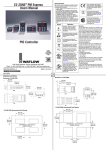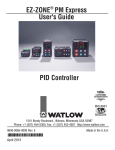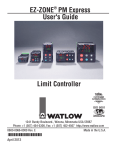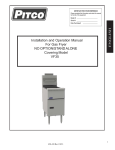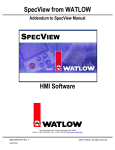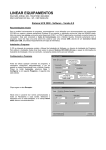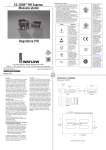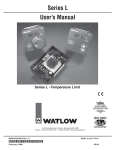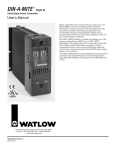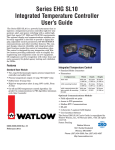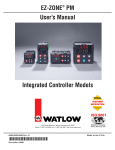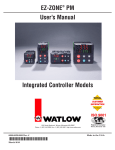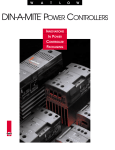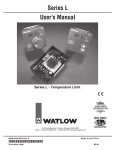Download Watlow PM Express Manual - Seagate Control Systems
Transcript
EZ-ZONE® PM Express Users Manual Safety Information We use note, caution and warning symbols throughout this book to draw your attention to important operational and safety information. A “NOTE” marks a short message to alert you to an important detail. A “CAUTION” safety alert appears with information that is important for protecting your equipment and performance. Be especially careful to read and follow all cautions that apply to your application. A “WARNING” safety alert appears with information that is important for protecting you, others and equipment from damage. Pay very close attention to all warnings that apply to your application. The electrical hazard symbol, (a lightning bolt in a triangle) precedes an electric shock hazard CAUTION or WARNING safety statement. Further explanations follow: Symbol Unit is a Listed device per Underwriters Laboratories®. It has been evaluated to United States and Canadian requirements for Process Control Equipment. UL 61010 and CSA C22.2 No. 61010. File E185611 QUYX, QUYX7. See: www. ul.com Unit is a Listed device per Underwriters Laboratories®. It has been evaluated to United States and Canadian requirements for Hazardous Locations Class 1 Division II Groups A, B, C and D. ANSI/ ISA 12.12.01-2007. File E184390 QUZW, QUZW7. See: www. ul.com Explanation CAUTION – Warning or Hazard that needs further explanation than label on unit can provide. Consult users manual for further information. ESD Sensitive product, use proper grounding and handling techniques when installing or servicing product. PID Controller Unit is compliant with European Union directives. See Declaration of Conformity for further details on Directives and Standards used for Compliance. Unit protected by double/reinforced insulation for shock hazard prevention. Unit has been reviewed and approved by Factory Mutual as a Temperature Limit Device per FM Class 3545 standard. See: www.fmglobal. com Do not throw in trash, use proper recycling techniques or consult manufacturer for proper disposal. TOTAL CUSTOMER SATISFACTION 3 Year Warranty Unit can be powered with either alternating current (ac) voltage or direct current (dc) voltage. ISO 9001 Registered Company Unit has been reviewed and approved by CSA International for use as Temperature Indicating-Regulating Equipment per CSA C22.2 No. 24. See: www.csainternational.org Winona, Minnesota USA 1241 Bundy Boulevard., Winona, Minnesota USA 55987 Phone: +1 (507) 454-5300, Fax: +1 (507) 452-4507 http://www.watlow.com 0600-0065-0000 Rev. D Made in the U.S.A. April 2010 Warranty The EZ-ZONE® PM is manufactured by ISO 9001-registered processes and is backed by a three-year warranty to the first purchaser for use, providing that the units have not been misapplied. Since Watlow has no control over their use, and sometimes misuse, we cannot guarantee against failure. Watlow’s obligations hereunder, at Watlow’s option, are limited to replacement, repair or refund of purchase price, and parts which upon examination prove to be defective within the warranty period specified. This warranty does not apply to damage resulting from transportation, alteration, misuse or abuse. The purchaser must use Watlow parts to maintain all listed ratings. Technical Assistance If you encounter a problem with your Watlow controller, review your configuration information to verify that your selections are consistent with your application: inputs, outputs, alarms, limits, etc. If the problem persists, you can get technical assistance from your local Watlow representative (see back cover), by e-mailing your questions to [email protected] or by dialing +1 (507) 494-5656 between 7 a.m. and 5 p.m., Central Standard Time (CST). Ask for an Applications Engineer. Please have the following information available when calling: • Complete model number • All configuration information • User's Manual • Factory Page Return Material Authorization (RMA) 1. Call Watlow Customer Service, (507) 4545300, for a Return Material Authorization (RMA) number before returning any item for repair. If you do not know why the product failed, contact an Application Engineer or Product Manager. where you pay only for what you need. So if you are looking for a single or multi-loop PID controller, an over-under limit controller or an integrated controller (PID and Limit), the EZ-ZONE family of controls can meet all of your needs. Point your browser to http://www.watlow.com to find out more about the EZ-ZONE family of controls. For this particular control, serial communications is accomplished using Watlow's Standard Bus protocol. If the need arises to network your controls and communicate using other popular protocols such as Modbus RTU/TCP®, EtherNet/IPTM, DeviceNetTM or Profibus DP consider using the EZ-ZONE family Remote User Interface/Gateway (RUI/GTW). 1 2 3 4 Installation and Wiring Dimensions 1/32 DIN 15.9 mm 0.63 in 53.3 mm 2.10 in 101.6 mm 4.00 in 31.2 mm 1.23 in 30.9 mm 1.22 in Side Front Top 45.2 mm (1.78 in) 22.4 mm (0.88 in) Recommended panel spacing panel thickness 1.53 to 9.52 mm (0.060 to 0.375) 21.6 mm (0.85 in) The EZ-ZONE PM Controller User’s Manual is copyrighted by Watlow Winona, Inc., © April 2010 with all rights reserved. The EZ-ZONE PM is covered by U.S. Patent No. 6,005,577 and Patents Pending Overview The EZ-ZONE PM Express controllers take the pain out of solving your thermal loop requirements while reducing the cost of control-loop ownership. You can order this control as a single loop PID controller with a high-amperage power output in either a 16th or 32nd DIN panel-mount package. It just got a whole lot easier to solve the thermal requirements of your system. Because the EZ-ZONE family of controls are highly scalable 21.6 mm (0.85 in) 1/32 DIN Maximum Cutout Dimensions 1/16 DIN Installation CASE CASE 15.8 mm (0.62 in) BEZEL 101.6 mm (4.00 in) 53.3 mm (2.10 in) GASKET BEZEL RETENTION COLLAR 53.3 mm (2.10 in) Side 1. Make the panel cutout using the mounting template dimensions in this chapter. Insert the case assembly into the panel cutout. Front 2. While pressing the case assembly firmly against the panel, slide the mounting collar over the back of the controller. 51.2 mm (2.02 in) If the installation does not require a NEMA 4X seal, slide the mounting collar up to the back of the panel tight enough to eliminate the spacing between the gasket and the panel. Top 45.2 mm (1.78 in) PANEL Removing the Mounted Controller from Its Case 1. From the controller's face, pull out the tab on each side until you hear it click. GASKET PANEL RETENTION COLLAR Pull out the tab on each side until you hear it click. Grab the unit above and below the face and pull forward. 2.Once the sides are released, grab the unit above and below the face with two hands and pull the unit out. If it is difficult to pull the unit out, remove the connectors from the back of the controller. This should make it easier to remove. Recommended panel spacing Ó Warning: Slide the mounting collar over the back of the controller. 45.2 mm (1.78 in) Place the blade of a screwdriver in the notch of the mounting collar assembly. 3. For a NEMA 4X seal, place the blade of a screwdriver in the notch of the mounting collar assembly and push toward the panel while applying pressure to the face of the controller. Don't be afraid to apply enough pressure to properly install the controller. The seal system is compressed more by mat- ing the mounting collar tighter to the front panel (see picture). If you can move the case assembly back and forth in the cutout, you do not have a proper seal. The tabs on each side of the mounting collar have teeth that latch into the ridges on the sides of the controller. Each tooth is staggered at a different depth from the front so that only one of the tabs, on each side, is locked onto the ridges at a time. panel thickness 1.53 to 9.52 mm (0.060 to 0.375) 21.6 mm (0.85 in) 21.6 mm (0.85 in) Returning the Controller to its Case 1.Ensure that the orientation of the controller is correct and slide it back into the housing. 2. Using your thumbs push on either side of the controller until both latches click. Note: The controller is keyed so if it feels that it will not slide back in do not force it. Check the ori- entation again and reinsert after correcting. Chemical Compatibility This product is compatible with acids, weak alkalis, alcohols, gamma radiation and ultraviolet radiation. This product is not compatible with strong alkalis, organic solvents, fuels, aromatic hydrocarbons, chlorinated hydrocarbons, esters and keytones. 56 78 Terminal Definitions Slot C Note: Terminal Function Model 98 99 power input: ac or dc+ power input: ac or dc- PM _(C)_ _ _ - AAAAB _ _ CF CD CE Standard Bus EIA-485 common Standard Bus EIA-485 T-/RStandard Bus EIA-485 T+/R+ PM _(C)_ _ _ - AAAAB _ _ In the pictures below notice that the Slot A connector does not show labeling for the outputs. Labeling for Slot A outputs is based on the controller part number. Slot A Universal Sensor input 1: all configurations Configuration 2 common (Any switched dc output can use.) dc- (open collector) dc+ Switched dc/open collector, output 1: PM _(C)_ C _-_ AAAB _ _ dcdc+ Switched dc, output 2: PM _ (C) _ _ C - _ AAAB _ _ F1 G1 H1 voltage or current voltage + current + Universal Process, output 1: PM _ (C) _ F _ - _ AAAB _ _ L1 K1 J1 normally open common normally closed Mechanical Relay 5 A, Form C, output 1: PM _(C)_ E _-_ AAAB _ _ L2 K2 normally open common NO-ARC 15 A, Form A, output 2: PM6(C) _ _ H - _ AAAB _ _ L2 K2 normally open common Mechanical Relay 5 A, Form A, output 2: PM _(C)_ _ J-_ AAAB _ _ L2 K2 normally open common Solid-State Relay 0.5 A, Form A output 1: PM _(C)_ K _ - _ AAAB _ _ output 2: PM _(C)_ _ K - _ AAAB _ _ W1 Y1 W2 Y2 L1 K1 CF CD CE C Slot C A Slot A 99 CF Output 2 Terminal Function Outputs 1 99 98 CD CE Output 1 Output 2 T1 S1 R1 T1 S2 (RTD) or current +, S3 (RTD), thermocouple -, current - or volts S1 (RTD), thermocouple + or volts + X1 Slot C Output 1 Input 1 R1 Slot B 98 Slot A T1 S1 All electrical power to the controller and con- trolled circuits must be disconnected before removing the controller from the front panel or disconnecting other wiring. Failure to follow these instructions may cause an electrical shock and/or sparks that could cause an explo- sion in class 1, div. 2 hazardous locations. S1 R1 Ó Warning: Use National Electric (NEC) or other countryspecific standard wiring and safety practices when wiring and connecting this controller to a power source and to electrical sensors or peripheral devices. Failure to do so may result in damage to equipment and property, and/or injury or loss of life. Note: Adjacent terminals may be labeled differently, depending on the model number. Note: To prevent damage to the controller, do not connect wires to unused terminals. Note: Maintain electrical isolation between analog input 1 and switched dc/open collector outputs. Note: Maximum wire size termination and torque rating: • 0.0507 to 3.30 mm2 (30 to 12 AWG) single- wire termination or two 1.31 mm2 (16 AWG) • 0.8 Nm (7.0 lb.-in.) torque Power Slot C 98 99 CF CD CE power power fuse • 47 to 63 Hz • 10VA maximum power consumption Low Power • 12 to 40VÎ (dc) • 20 to 28VÅ (ac) Semi Sig F47 High Power • 85 to 264VÅ (ac) Power •100 to 240VÅ (ac) Semi Sig F47 Note: In the drawings below for each input notice that the Slot A connector labeling is identified. Note: When using a 2 wire RTD, jumper S1 and T1 together Inputs All inputs shown below represent input 1 (the only input) and are to be connected to slot A of the PID Control. Process Volts - RTD 2 or 3 Wire S1 + R1 S2 S3 S1 T1 Power Supply Note: Switched dc and Process outputs use a common power supply with a maximum current output of 40mA. As an example, supplied current (mA) from output 1 and 2 can be 20/20, 30/10, 40/0, 10/30, etc... Outputs Please note all outputs are connected exclusively to slot A. Output availability is based on the part number of your PID Control. - Switched DC Solid-State Relay Form A Thermocouple S1 common L1 and/or L2 dc W1 and/or W2 + R1 dc + Y1 and/or Y2 K1 and/or K2 S1 PM _ (C) _ C C - A A A A B _ _ PM _ (C) _ K K - A A A A B _ _ R1 Process Amperes Mechanical Relay Form C Universal Process F1 negative + T1 - L1 normally open S1 Process Volts and Amperes • 4 to 20 mA @ 100 Ω input impedance • 0 to 10VÎ (dc) @ 20 kΩ input impedance • Scalable Resistance Temperature Detector (RTD) • Platinum, 100 Ω @ 0°C • Calibration to DIN curve (0.00385 Ω/Ω/°C) • 20 Ω total lead resistance • RTD excitation current of 0.09 mA typical. Each ohm of lead resistance may affect the reading by 0.03°C. • For 3-wire RTDs, the S1 lead must be connected to R1. • For best accuracy use a 3-wire RTD to compensate for lead-length resistance. All three lead wires must have the same resistance. G1 volts + 4 Thermocouple • 2 KΩ maximum source resistance • >20 MΩ input impedance • 3 microampere open-sensor detection • Thermocouples are polarity sensitive. The negative lead must be connected to S1. • To reduce errors, the extension wire for thermocouples must be of the same alloy as the thermocouple. K1 common J1 normally closed H1 current + PM _ (C) _ E _ - A A A A B _ _ PM _ (C) _ F _ - A A A A B _ _ NO-ARC Relay Form A Open Collector Power Supply L2 common X1 dc W1 K2 Load PM _ (C) _ _ H - A A A A B _ _ PM _ (C) _ C _ - A A A A B _ _ Mechanical Relay Form A L2 K2 Switched DC • Supplied current up to a maximum of 40 mA. See Power Supply note above. • Short circuit limited to <50 mA • 22 to 32VÎ (dc) open circuit voltage • Use dc- and dc+ to drive external solid-state relay. • DIN-A-MITE compatible - single-pole: up to 4 in parallel or 4 in series - 2-pole: up to 2 in parallel or 2 in series - 3-pole: up to 2 in series Open Collector • 100 mA maximum output current sink • 30VÎ (dc) maximum supply voltage • Any switched dc output can use the common terminal. • Use an external power supply to control a dc load, with the load positive to the positive of the power supply, the load negative to the open collector and common to the power supply negative. See Quencharc note. Mechanical Relay Form C • 5 A at 240VÅ (ac) or 30VÎ (dc) maximum resistive load • 20 mA at 24V minimum load • 125 VA pilot duty at 120/240VÅ (ac), 25 VA at 24VÅ (ac) • 100,000 cycles at rated load • Output does not supply power. • For use with ac or dc See Quencharc note. Mechanical Relay Form A • 5 A at 240VÅ (ac) or 30VÎ (dc) maximum resistive load • 20 mV at 24V minimum load • 125 VA pilot duty @ 120/240VÅ (ac), 25 VA at 24VÅ (ac) • 100,000 cycles at rated load • Output does not supply power. • For use with ac or dc See Quencharc note. NO-ARC Relay Form A • 15 A at 85 to 264VÅ (ac) resistive load only • 1/16 DIN models only • 2,000,000 cycle rating for NO-ARC circuit • • • • 100 mA minimum load 2 mA maximum off state leakage Do not use on dc loads. Output does not supply power. Solid-State Relay Form A • 0.5 A at 20 to 264VÅ (ac) maximum resistive load • 20 VA 120/240VÅ (ac) pilot duty • Opto-isolated, without contact suppression • Maximum off state leakage of 105 microamperes • Output does not supply power • Do not use on dc loads. • See Quencharc note. Universal Process • 4 to 20 mA into 800 Ω maximum load • 0 to 10VÎ (dc) into voltage 1 kΩ minimum load • Scalable • Output supplies power (See Power Supply note above). • Cannot use voltage and current outputs at same time 9 10 11 12 Quencharc Note: Switching pilot duty inductive loads (relay coils, solenoids, etc.) with the mechanical relay, solid state relay or open collector output options requires use of an R.C. suppressor. PM _ (C) _ _ J - A A A A B _ _ Keys & Displays 16th DIN PID Controller Zone Display: When [2onE] (found in the Factory Page) is set to on, indicates the controller zone. [1] to [9] = zones 1 to 9 [E] = zone 14 [A] = zone 10 [F] = zone 15 [b] = zone 11 [h] = zone 16 [C] = zone 12 [d] = zone 13 Upper Display: In the Operations Menu, displays the process value, otherwise displays the value of the parameter in the lower display. ® Infinity Key: ˆ Clears and Silences alarms, press to back up one level, or press and hold for two seconds to return to the Operations Menu. A Output Activity: Number lights indicate activity of outputs 1 and 2. Percent Units Indicator: Lights when the controller is displaying values as a percentage or when the open-loop set point is displayed. Lower Display: Indicates the set point or output power value during operation, or the parameter whose value appears in the upper display. A/M Key: This key will toggle the control mode between the current value of the C.M prompt (Off, MAn, AUto) and Manual when the A/M button is pushed and held for 3 seconds. Temperature Units Indicator Lights: Indicates whether the temperature is displayed in Fahrenheit or Celsius. Communications Activity: Flashes when another device is communicating with this controller. M Up and Down Keys: ¿ ¯ In the Operations Menu, adjusts the set point in the lower display. In other pages, changes the upper display to a higher or lower value, or changes a parameter selection. Advance Key: ‰ Advances through parameter prompts. 32nd DIN PID Controller With a few exceptions, all of the key functions described for the 16th DIN PID Controller apply to the 32nd DIN PID Controller as well. Left Display: In the Operations Menu, displays the process value, otherwise displays the value of the parameter in the left display. 1 2 ® % Right Display: Indicates the set point or output power value during operation, or the parameter whose value appears in the right display. Responding to a Displayed Message (16th or 32nd DIN) An active message will cause the display to toggle between the normal settings and the active message in the upper or left display and [Attn] in the lower or right display. Your response will depend on the message and the controller settings. Some messages, such as Tuning, indicate that a process is underway. If a message is generated in the right or lower display that can be cleared (such as [AL;h1]), simply push the infinity ˆ key to execute the action ([CLr]). [AL;L1] Alarm Low 1 (sensor input below low alarm set point) [AL;h1] Alarm High 1 (sensor input above high alarm set point) [AL;E1] Alarm Error 1 (alarm state cannot be determined due to lack of sensor input) [Er;i1] Error Input 1 (sensor is not providing a valid signal to the control) [tUn1] Tuning (controller is autotuning the control loop) [`rP1] Ramping (controller is ramping to a new set point) Upon power up of the control, using the advance key will scroll through the various prompts found in the Operations Menu. At any point within the Operations menu to return to the default display push the Infinity ˆ key. Operations Menu 16th & 32nd DIN PID Controller Display Autotune Start an autotune. While active the upper or left and lower or right display will flash [tUn1] and [Attn]. Appears if: Heat or cool algorithm set to PID [``no] No [`yES] Yes [`C;M] [ C.M] Control Mode Active View the current control mode. Appears if: Always [`off] Off [AUto] Auto [MAn] Manual [`h;Pb] [ h.Pb] Heat Proportional Band Set the PID proportional band for the heat outputs. Appears if: Heat algorithm set to PID 0 to 9,999.000°F or units 0 to 5,555.000°C Units, 25.0°F or 14.0°C [`C;Pb] [ C.Pb] Cool Proportional Band Set the PID proportional band for the cool outputs. Appears if: Cool algorithm set to PID 0 to 9,999.000°F or units 0 to 5,555.000°C Units, 25.0°F or 14.0°C [``ti] [ ti] Time Integral Set the PID integral for the outputs. Appears if: Heat or cool algorithm set to PID 0 to 9,999 seconds per repeat 180.0 [``td] [ td] Time Derivative Set the PID derivative time for the outputs. Appears if: Heat or cool algorithm set to PID 0 to 9,999 seconds 0.0 seconds [o;tb1] [o.tb1] Time Base Output 1 Set the time base for fixed-time-base control. Appears if: Output 1 set to heat or cool with control algorithm set to PID. 0.1 to 60.0 seconds (solid-state relay or switched dc) 5.0 to 60.0 seconds (mechanical relay & NO-ARC power control) 1 sec. [SSR & sw dc], 20.0 sec. [mech. relay & NO-ARC] [o;tb2] [o.tb2] Time Base Output 2 Set the time base for fixed-time-base control. Appears if: Output 2 set to heat or cool with control algorithm set to PID. 0.1 to 60.0 seconds (solid-state relay or switched dc) 5.0 to 60.0 seconds (mechanical relay & NO-ARC power control) 1 sec. [SSR & sw dc], 20.0 sec. [mech. relay & NO-ARC] [`A;Lo] [ A.Lo] Alarm Low Set Point Process - set the process value that will trigger a low alarm. Deviation - set the span of units from the closed loop set point that will trigger a low alarm. Appears if: If Alarm Type (A.ty) is set to Process or Deviation Alarm -1,999.000 to 9,999.000°F or units -1,128.000 to 5,537.000°C Units, 32.0°F or 0.0°C [`A;hi] [ A.hi] Alarm High Set Point Process - set the process value that will trigger a high alarm. Deviation - set the span of units from the closed loop set point that will trigger a high alarm. Appears if: If Alarm Type (A.ty) is set to Process or Deviation Alarm -1,999.000 to 9,999.000°F or units -1,128.000 to 5,537.000°C Units, 300.0°F or 150.0°C [`i;CA] [ i.CA] Calibration Offset Set an offset value for a process output. Appears if: Always -1,999.000 to 9,999.000°F or units -1,110.555 to 5,555.000°C 0.0 Operations Menu [`AUt] Autotune ‰ [`C;M] Control Mode [`h;pb] Heat Proportional Band [`C;pb] Cool Proportional Band [``ti] Time Integral [``td] Time Derivative [o;tb1] Time Base [o;tb2] Time Base [`A;lo] Alarm Low Set Point [`A;hi] Alarm High Set Point [`i;Ca] Calibration Offset To enter the Setup Menu push and hold the up and down arrow keys for approximately 3 seconds. Once there, push the green advance key to scroll through to the prompt of choice and then use the up and down arrow keys to change the range. At any point within the Setup menu to return to the default display push the Infinity ˆ key. 13 14 15 16 Setup Menu 16th & 32nd DIN PID Controller Display [LoC] [LoC] Setup Menu [`SEn] Sensor Type [`Lin] Linearization [`deC] Decimal [`C_F] Display Units [Sen] [ SEn] Sensor Type Set the analog sensor type to match the device wired to this input. Appears if: Always [`r;lo] Range Low [`r;hi] Range High [`fn1] Function One [Lin] [ Lin] [`o;ty] Output Type Linearization Set the linearization to match the thermocouple type wired to this input. For example, select [```H] for a type K thermocouple. Appears if: Sensor Type is set to Thermocouple. [`fn2] Function Two [`h;ag] Heat Algorithm [`h;sC] Heat Hysteresis [`A;hy] Alarm Hysteresis [`A;bl] Alarm Blocking [`A;si] Alarm Silencing [A;dsp] Alarm Display [``rp] Ramp Action [`r;rt] Ramp Rate B C D E F [`J] [`H] [`n] [`r] [`S] J K N R S Display Units Select which units will be displayed. Appears if: Always [```F] °F [r;Lo] [ r.Lo] Range Low Set the low range of the set point. Appears if: Always -1,999.000 to 9,999.000 [r;hi] [ r.hi] Range High Set the high range of the set point. Appears if: Always -1,999.000 to 9,999.000 [`fn1] [ fn1] Function of Output 1 Select which function will drive this output. Appears if: If output 1 is ordered [o;hi1] Power Scale High Output 1 [`o;ty] [o;hi2] Power Scale High Output 2 [ o.ty] [`Ad;s] Zone Address [`b] [`c] [`d] [`e] [`f] [`C_F] [ C_F] [s;hi1] Scale High [par2] Lower or Right Display [`MA] Milliamps dc [r0;1H] RTD 100 Ω [```0] Whole [s;lo1] Scale Low [par1] Upper or Left Display [``tC] Thermocouple [uolT] Volts dc Decimal Set the precision of the displayed value. Appears if: Always [`A;lg] Alarm Logic [`A;lA] Alarm Latching 1 to 5 1 Operations Menu (read only, A/M button disabled)* 2 Operations Menu (A/M button disabled, Set point R/W)* 3 Operations Menu (A/M button enabled, Set point R/W, Control Mode R/W)* 4 Operations Menu R/W access* 5 Operations Menu and Setup Menu full R/W access *You can change the security level at any level [`dEC] [ dEC] [`C;Ag] Cool Algorithm [`A;ty] Alarm Type Range (Defaults are shown bold) Parameter Name Description Lockout Menu Set the security clearance level. The user can access the selected level and all lower levels. Appears if: Always [`loC] Lockout Menu ‰ Range (Defaults are shown bold) Parameter Name Description [`AUt] [ AUt] [``0;0] Tenths [`0;00] Hundredths [```C] °C 0.0 [`oFF] Off [CooL] Cool [hEAt] Heat [ALM] Alarm Output Type Select whether the process output will operate in volts or milliamps. Appears if: A process output (PM _ C _ F _-_ AAAB _ _) [uoLt] Volts [`MA] Milliamps [`t] T To enter the Setup Menu push and hold the up and down arrow keys for approximately 3 seconds. Once there, push the green advance key to scroll through to the prompt of choice and then use the up and down arrow keys to change the range. At any point within the Setup menu to return to the default display push the Infinity ˆ key. Setup Menu [`loC] Lockout Menu [`SEn] Sensor Type Setup Menu 16th & 32nd DIN PID Controller Display [`fn2] [ fn2] [`deC] Decimal [`C_F] Display Units [`fn1] Function One [`o;ty] Output Type [`fn2] Function Two [`C;Ag] Cool Algorithm [`oFF] Off [`hSC] [ hSC] Hysteresis (Heat & Cool) Set the control switching hysteresis for on-off control. This determines how far into the “on” region the process value needs to move before the output turns on. Appears if: Heat or Cool Algorithm is set to On-Off. 0 to 9,999.000°F or units [`C;Ag] [ C.Ag] [`Pid] PID [on;of] On-Off [`A;lg] Alarm Logic [``rp] Ramp Action Alarm Hysteresis Set the hysteresis for an alarm. This determines how far into the safe region the process value needs to move before the alarm can be cleared. Appears if: When alarm type is set to process or deviation alarm 0.001 to 9,999.000°F or units [a;lg] [A.Lg] Alarm Logic Select what the output condition will be during the alarm state. Appears if: Always [`A;LA] [ A.LA] Alarm Latching Turn alarm latching on or off. A latched alarm has to be turned off by the user. Appears if: When alarm type is set to process or deviation alarm [`A;bL] [ A.bL] Alarm Blocking Select when an alarm will be blocked. After startup and/or after the set point changes, the alarm will be blocked until the process value enters the normal range. Appears if: When alarm type is set to process or deviation alarm [PR;AL] Process Alarm [dE;AL] Deviation Alarm 0.001 to 5,555.000°C Units, 1.0°F or 1.0°C [`a;lC] Close on Alarm [`a;lo] Open on alarm [nLAt] Non-Latching [`LAt] Latching [`oFF] Off [`Str] Startup [StPt] Set Point [both] Both [s;lo1] Scale Low [o;hi1] Power Scale High Output 1 [on;of] On-Off [`A;hy] [ A.hy] [`r;rt] Ramp Rate [s;hi1] Scale High [`Pid] PID [`oFF] Off [`A;si] Alarm Silencing [A;dsp] Alarm Display [`oFF] Off Cool Algorithm Set the cool control method. Appears if: If Output 1 or 2 is set to cool Alarm Type Select how the alarm will or will not track the set point. Appears if: Always [`A;lA] Alarm Latching [`A;bl] Alarm Blocking 0 to 5,555.000°C Units, 3.0°F or 2.0°C [`A;ty] [ A.ty] [`A;ty] Alarm Type [`A;hy] Alarm Hysteresis [hEAt] Heat Heat Algorithm Set the heat control method. Appears if: Output 1 or 2 set to heat [`h;ag] Heat Algorithm [`h;sC] Heat Hysteresis [CooL] Cool [`h;Ag] [ h.Ag] [`r;lo] Range Low [`r;hi] Range High [`oFF] Off [ALM] Alarm [`Lin] Linearization ‰ Range (Defaults are shown bold) Parameter Name Description Function of Output 2 Select which function will drive this output. Appears if: If output 2 is ordered [`A;si] [ A.Si] [o;hi2] Power Scale High Output 2 Alarm Silencing Turn alarm silencing on to allow the user to disable the output tied (configured) to this alarm Appears if: When alarm type is set to process or deviation alarm [`oFF] Off [``on] On [par1] Upper or Left Display [par2] Lower or Right Display [`Ad;s] Zone Address To enter the Setup Menu push and hold the up and down arrow keys for approximately 3 seconds. Once there, push the green advance key to scroll through to the prompt of choice and then use the up and down arrow keys to change the range. At any point within the Setup menu to return to the default display push the Infinity ˆ key. 17 18 19 20 Setup Menu 16th & 32nd DIN PID Controller Display Alarm Display Display an alarm message when an alarm is active. Appears if: When alarm type is set to process or deviation alarm [`oFF] Off [``rP] [ rP] Ramp Action Select when the controller's set point will ramp to the defined end set point. Appears if: Always [`oFF] Off Setup Menu [`loC] Lockout Menu [`SEn] Sensor Type ‰ [`Lin] Linearization [`deC] Decimal [`C_F] Display Units [`fn1] Function One [`h;ag] Heat Algorithm [`h;sC] Heat Hysteresis [`C;Ag] Cool Algorithm [`A;lg] Alarm Logic [`A;lA] Alarm Latching [`A;bl] Alarm Blocking 1.0°F degrees or units per hour 1.0°C [s;lo1] [S.Lo1] Scale Low Output 1 Set minimum value of output 1 range. Appears if: Output 1 is a Process set to heat or cool -100.0 to 100.0 [s;hi1] [S.hi1] Scale High Output 1 Set maximum value of output 1 range. Appears if: Output 1 is a Process set to heat or cool -100.0 to 100.0 [o;hi1] [o.hi1] Power Scale High Output 1 Set maximum value of output 1 range. Appears if: Output 1 is Switched and set to heat or cool 0.0 to 100% [o;hi2] [o.hi2] Power Scale High Output 2 Set maximum value of output 2 range. Appears if: Output 2 is Switched and set to heat or cool 0.0 to 100% [PAr1] [PAr1] Upper or Left Display Select parameter to display. Appears if: Always [PAr2] [PAr2] Lower or Right Display Select parameter to display. Appears if: Always [AC;SP] [`A;hi] [`A;Lo] [none] [`ad;s] [ Ad.S] Zone Address - Standard Bus Communication Set zone address from 1-16. Appears if: Always 1-16 1 [`A;si] Alarm Silencing [A;dsp] Alarm Display [``rp] Ramp Action [`r;rt] Ramp Rate [s;lo1] Scale Low [s;hi1] Scale High [o;hi1] Power Scale High Output 1 [o;hi2] Power Scale High Output 2 [par1] Upper or Left Display [par2] Lower or Right Display [`Ad;s] Zone Address [StPt] Set Point Change [both] Both [`A;ty] Alarm Type [`A;hy] Alarm Hysteresis [`Str] Startup Ramp Rate Set the rate for the set point ramp. Set the time units for the rate with the Ramp Scale parameter. Appears if: Ramp Action is set to Startup, Set Point or Both. [`o;ty] Output Type [`fn2] Function Two [``on] On [`r;rt] [ r.rt] [`r;lo] Range Low [`r;hi] Range High Range (Defaults are shown bold) Parameter Name Description [A;dSP] [A.dSP] 0.0 10.0 100.0 100.0 [AC;Pu] Active Process Value [none] none Active Set Point Alarm High Set Point Alarm Low Set Point None Specifications Line Voltage/Power • All voltage levels represent minimums and maximums • 85 to 264V~(ac), 47 to 63Hz • 20 to 28VÅ(ac), +10/-15 percent; 50/60Hz, ±5 percent • 12 to 40VÎ(dc) • 10VA maximum power consumption • Data retention upon power failure via nonvolatile memory • Compliant with SEMI F47-0200, Figure R1-1 voltage sag requirements @ 24VÅ(ac) or higher Environment • -18 to 65°C (0 to 149°F) operating temperature • -40 to 85°C (-40 to 185°F) storage temperature • 0 to 90 percent RH, non-condensing Accuracy • Calibration accuracy and sensor conformity: ±0.1 percent of span, ±1°C @ the calibrated ambient temperature and rated line voltage • Type S, 0.2 percent • Type T, below -50°C; 0.2 percent • Calibration ambient temperature @ 25°C ±3°C (77°F ±5°F) • Accuracy span: 540°C (1000°F) minimum • Temperature stability: ±0.1°C/°C (±0.1°F/°F) rise in ambient maximum Agency Approvals • UL®/EN 61010 Listed • ANSI/ISA 12.12.01-2007 Class 1 Division 2 Groups A, B, C, D, Temperature Code T4A. • UL® 50, NEMA 4X, EN 60529 IP66 (indoor use only) • CSA C22.2 No. 24 File 158031 • RoHS, W.E.E.E. • SEMI F47-0200 Controller • User selectable heat/cool, on-off, P, PI, PD, PID or alarm action • Auto-tune control algorithm • Control sampling rates: input = 10Hz, outputs = 10Hz • Input and output capacity per controller type ordering information Serial Communications • Isolated communications • Standard Bus Configuration Protocol Wiring Termination—Touch-Safe Terminals • Input, power and controller output terminals are touch safe removable 12 to 22 AWG Ordering Part Number • Use 75°C, Cu conductor only Universal Input • Thermocouple, grounded or ungrounded sensors • >20MΩinput impedance • Maximum of 2KΩ source resistance • RTD 2- or 3-wire, platinum, 100Ω @ 0°C calibration to DIN curve (0.00385 Ω/Ω/°C) • Process, 4-20mA @ 100Ω, or 0-10VÎ(dc) @ 20kΩ input impedance; scalable Functional Operating Range • Type B: -50 to 1816°C (-58 to 3301°F) • Type C: 0 to 2315°C (32 to 4199°F) • Type D: 0 to 2315°C (-328 to 4199°F) • Type E: -270 to 1000°C (-454 to 1832°F) • Type F: 0 to 1343°C (32 to 2449°F) • Type J: -210 to 1200°C (-346 to 2192°F) • Type K: -270 to 1371°C (-454 to 2500°F) • Type N: -200 to 1300°C (-328 to 2372°F) • Type R: -50 to 1767°C (-58 to 3213°F) • Type S: -50 to 1767°C (-58 to 3213°F) • Type T: -270 to 400°C (-454 to 752°F) • RTD (DIN): -200 to 800°C (-328 to 1472°F) • Process: -1999 to 9999 units Output Hardware • Switched dc, 22 to 32VÎ(dc) with a maximum of 40 mA supply current available. • Open collector, maximum sink current 100 mA, @ 30VÎ(dc) • Solid state relay (SSR), Form A, 0.5A @ 24VÅ(ac) minimum, 264VÅ(ac) maximum, opto-isolated, without contact suppression • Electromechanical relay, Form C, 5A, 24 to 240VÅ(ac) or 30VÎ(dc) maximum, resistive load, 100,000 cycles at rated load • Electromechanical relay, Form A, 5A, 24 to 240VÅ(ac) or 30VÎ(dc) maximum, resistive load, 100,000 cycles at rated load • NO-ARC relay, Form A, 15A, 24 to 240VÅ(ac), no VÎ(dc), resistive load, 2 million cycles at rated load • Universal process: - 0 to 10VÎ(dc) into a minimum 1,000Ω load - 4 to 20mA into maximum 800Ω load Operator Interface • Dual 4 digit, 7 segment LED displays • Typical display update rate 1Hz • Advance, infinity, up and down keys plus an EZ-KEY key (not available in 1⁄32 DIN) • EZ-KEY automatically programmed as an Auto/ Manual transfer mode function. (Part number digits 1 through 14) PMXCXXX-AAAABXX All Models include: *Universal Sensor Input, Standard Bus Configuration Communications *Dual line Red over Green 7 Segment displays Package Size (Digit #3) 3 = 1/32 DIN 6 = 1/16 DIN 8 = 1/8 DIN vertical (future option) 9 = 1/8 DIN horizontal (future option) 4 = 1/4 DIN (future option) Primary Function (Digit #4) C = PID Controller w/ Universal Input Power Supply (Digit #5) 1 = 100-240 VAC 3 = 12-28VAC/DC Output 1 and 2 Hardware Options (Digits #6 and #7) Output 1 Output 2 CA=Switched dc/open collector None CH=Switched dc/open collector NO-ARC 15 Amp power control CC=Switched dc/open collector Switched DC CJ =Switched dc/open collector Mechanical relay 5A, Form A CK=Switched dc/open collector SSR Form A, 0.5 Amp EA=Mechanical Relay 5 Amp form C None EH=Mechanical Relay 5 Amp form C NO-ARC 15 Amp power control EC=Mechanical Relay 5 Amp form C Switched DC EJ =Mechanical Relay 5 Amp form C Mechanical relay 5A, Form A EK=Mechanical Relay 5 Amp form C SSR Form A, 0.5 Amp FA =Universal Process None FC=Universal Process Switched DC FJ =Universal Process Mechanical relay 5A, Form A FK=Universal Process SSR Form A, 0.5 Amp AK=None SSR Form A, 0.5 Amp KK=SSR Form A, 0.5 Amp SSR Form A, 0.5 Amp Future Options (Digits #8 thru #11) AAAA=None Menu Type (Digits #12) B = PM Express with English manual (Limit or PID) Additional Options (Digits #13 and #14) AA= Standard EZ-ZONE face plate 12= Class 1, Div 2 (not available with Limit Controller or mechanical relay outputs) Multilingual User Manuals (PID only) and associated Watlow part numbers: - English - Chinese - Japanese - Korean - German - French - Italian - Spanish 0600-0065-0000 0600-0065-0001 0600-0065-0002 0600-0065-0003 0600-0065-0004 0600-0065-0005 0600-0065-0006 0600-0065-0007 21 22 23 24 Declaration of Conformity Series EZ-ZONE® PM WATLOW an ISO 1241 Bundy Blvd. Winona, MN 55987 USA 9001 approved facility since 1996. Declares that the following product: Designation: Series EZ-ZONE® PM (Panel Mount) Model Numbers: PM (3, 6, 8, 9 or 4)(Any Letter or number) – (1, 2, 3 or 4)(A, C, E, F or K) (A, C, H, J or K)(Any letter or number) – (Any letter or number)(A, C, E, F or K)(A, C, H, J or K) (Any three letters or numbers) Classification: Temperature control, Installation Category II, Pollution degree 2, IP66 Rated Voltage and Frequency: 100 to 240 V~ (ac 50/60 Hz) or 15 to 36 V�dc/ 24 V~ac 50/60 Hz Rated Power Consumption: 10 VA maximum PM3, PM6 Models. 14 VA maximum PM8, PM9, PM4 Models How to Reach Us Corporate Headquarters Europe Watlow Electric Manufacturing Company 12001 Lackland Road St. Louis, MO 63146 Sales: 1-800-WATLOW2 Manufacturing Support: 1-800-4WATLOW Email: [email protected] Website: www.watlow.com From outside the USA and Canada: Tel: +1 (314) 878-4600 Watlow France Tour d'Asnières. 4 Avenue Laurent Cély 92600 Asnières sur Seine France Tél: + 33 (0)1 41 32 79 70 Télécopie: + 33(0)1 47 33 36 57 Email: [email protected] Website: www.watlow.fr Fax: +1 (314) 878-6814 Latin America Watlow de México S.A. de C.V. Av. Fundición No. 5 Col. Parques Industriales Querétaro, Qro. CP-76130 Mexico Tel: +52 442 217-6235 Fax: +52 442 217-6403 Meets the essential requirements of the following European Union Directives by using the relevant standards show below to indicate compliance. 2004/108/EC Electromagnetic Compatibility Directive EN 61326-1 2006 EN 61000-4-2 EN 61000-4-3 EN 61000-4-4 EN 61000-4-5 EN 61000-4-6 EN 61000-4-11 EN 61000-3-2 1 EN 61000-3-3 SEMI F47 1996 +A1,A2 2006 2004 2006 1996 +A1,A2,A3 2004 2006 2005 2000 Electrical equipment for measurement, control and laboratory use – EMC requirements (Industrial Immunity, Class B Emissions). Electrostatic Discharge Immunity Radiated Field Immunity 10V/M 80–1000 MHz, 3 V/M 1.4–2.7 GHz Electrical Fast-Transient / Burst Immunity Surge Immunity Conducted Immunity Voltage Dips, Short Interruptions and Voltage Variations Immunity Harmonic Current Emissions Voltage Fluctuations and Flicker Specification for Semiconductor Sag Immunity Figure R1-1 1 For mechanical relay loads, cycle time may need to be extended up to 160 seconds to meet flicker requirements depending on load switched and source impedance. EN 61010-1 2006/95/EC Low-Voltage Directive 2001 Safety Requirements of electrical equipment for measurement, control and laboratory use. Part 1: General requirements Compliant with 2002/95/EC RoHS Directive Per 2002/96/EC W.E.E.E Directive Please Recycle Properly. Raymond D. Feller III Name of Authorized Representative Winona, Minnesota, USA Place of Issue General Manager Title of Authorized Representative June 2009 Date of Issue Signature of Authorized Representative CE DOC EZ-ZONE PM-06-09 Watlow GmbH Postfach 11 65, Lauchwasenstr. 1 D-76709 Kronau Germany Tel: +49 (0) 7253 9400-0 Fax: +49 (0) 7253 9400-900 Email: [email protected] Website: www.watlow.de Watlow Italy S.r.l. Viale Italia 52/54 20094 Corsico MI Italy Tel: +39 024588841 Fax: +39 0245869954 Email: [email protected] Website: www.watlow.it Asia and Pacific Watlow Ibérica, S.L.U. C/Marte 12, Posterior, Local 9 E-28850 Torrejón de Ardoz Madrid - Spain T. +34 91 675 12 92 F. +34 91 648 73 80 Email: [email protected] Website: www.watlow.es Watlow UK Ltd. Linby Industrial Estate Linby, Nottingham, NG15 8AA United Kingdom Telephone: (0) 115 964 0777 Fax: (0) 115 964 0071 Email: [email protected] Website: www.watlow.co.uk From outside The United Kingdom: Tel: +44 115 964 0777 Fax: +44 115 964 0071 Watlow Singapore Pte Ltd. 16 Ayer Rajah Crescent, #06-03/04, Singapore 139965 Tel: +65 6773 9488 Fax: +65 6778 0323 Email: [email protected] Website: www.watlow.com.sg Watlow Korea Co., Ltd. #1406, E&C Dream Tower, 46, Yangpyeongdong-3ga Yeongdeungpo-gu, Seoul 150-103 Republic of Korea Tel: +82 (2) 2628-5770 Fax: +82 (2) 2628-5771 Website: www.watlow.co.kr Watlow Australia Pty., Ltd. 4/57 Sharps Road Tullamarine, VIC 3043 Australia Tel: +61 3 9335 6449 Fax: +61 3 9330 3566 Website: www.watlow.com Watlow Malaysia Sdn Bhd No. 14-3 Jalan 2/114 Kuchai Business Centre Jalan Kuchai Lama 58200 Kuala Lumpur Malaysia Tel: +60 3 7980 7741 Fax: +60 3 7980 7739 Watlow Electric Manufacturing (Shanghai) Company 1118 Fangyuan Road, Anting Industrial Park, Jiading, Shanghai, PRC 201203 People’s Republic of China Tel: +86 21 39509510 Fax: +86 21 5080-0906 Email: [email protected] Website: www.watlow.cn 䝵䔈爜榊㳮匰㦘棟⏻⚇ 浧楓ゑⓜ摠●ₒ影ℛ恾壮㲢⃚ 榊崀 ⍂䦮 ዌእዊዙዘንዀኮዐ㪹㆞↩䯍 ᇽ㨀℻掌◒ⅲ䞿◉␔䯭䞿 ⥪⦌ኰወ⒴殷椝 Tel: 03-3518-6630 Fax: 03-3518-6632 Email: [email protected] Website: www.watlow.co.jp Watlow Electric Taiwan Corporation 10F-1 No.189 Chi-Shen 2nd Road Kaohsiung 80143 Taiwan Tel: +886-7-2885168 Fax: +886-7-2885568 Your Authorized Watlow Distributor Watlow Japan Ltd. 1-14-4 Uchikanda, Chiyoda-Ku Tokyo 101-0047 Japan Tel: +81-3-3518-6630 Fax: +81-3-3518-6632 Email: [email protected] Website: www.watlow.co.jp TOTAL CUSTOMER SATISFACTION 3 Year Warranty






